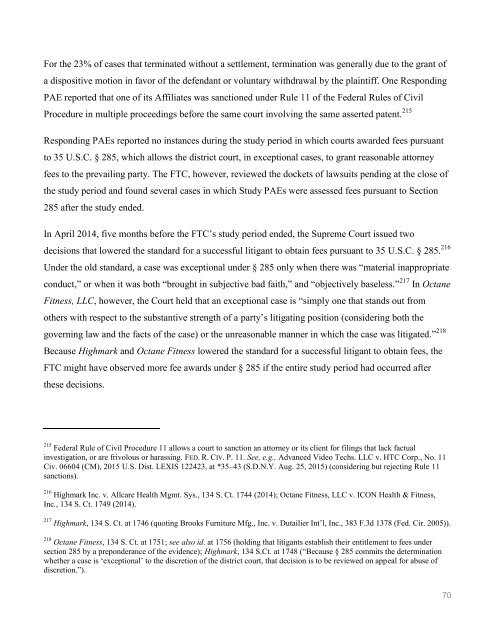You also want an ePaper? Increase the reach of your titles
YUMPU automatically turns print PDFs into web optimized ePapers that Google loves.
For the 23% of cases that terminated without a settlement, termination was generally due to the grant of<br />
a dispositive motion in favor of the defendant or voluntary withdrawal by the plaintiff. One Responding<br />
PAE reported that one of its Affiliates was sanctioned under Rule 11 of the Federal Rules of Civil<br />
Procedure in multiple proceedings before the same court involving the same asserted patent. 215<br />
Responding PAEs reported no instances during the study period in which courts awarded fees pursuant<br />
to 35 U.S.C. § 285, which allows the district court, in exceptional cases, to grant reasonable attorney<br />
fees to the prevailing party. The FTC, however, reviewed the dockets of lawsuits pending at the close of<br />
the study period and found several cases in which Study PAEs were assessed fees pursuant to Section<br />
285 after the study ended.<br />
In April 2014, five months before the FTC’s study period ended, the Supreme Court issued two<br />
decisions that lowered the standard for a successful litigant to obtain fees pursuant to 35 U.S.C. § 285. 216<br />
Under the old standard, a case was exceptional under § 285 only when there was “material inappropriate<br />
conduct,” or when it was both “brought in subjective bad faith,” and “objectively baseless.” 217 In Octane<br />
Fitness, LLC, however, the Court held that an exceptional case is “simply one that stands out from<br />
others with respect to the substantive strength of a party’s litigating position (considering both the<br />
governing law and the facts of the case) or the unreasonable manner in which the case was litigated.” 218<br />
Because Highmark and Octane Fitness lowered the standard for a successful litigant to obtain fees, the<br />
FTC might have observed more fee awards under § 285 if the entire study period had occurred after<br />
these decisions.<br />
215<br />
Federal Rule of Civil Procedure 11 allows a court to sanction an attorney or its client for filings that lack factual<br />
investigation, or are frivolous or harassing. FED. R. CIV. P. 11. See, e.g., Advanced Video Techs. LLC v. HTC Corp., No. 11<br />
Civ. 06604 (CM), 2015 U.S. Dist. LEXIS 122423, at *35–43 (S.D.N.Y. Aug. 25, 2015) (considering but rejecting Rule 11<br />
sanctions).<br />
216<br />
Highmark Inc. v. Allcare Health Mgmt. Sys., 134 S. Ct. 1744 (2014); Octane Fitness, LLC v. ICON Health & Fitness,<br />
Inc., 134 S. Ct. 1749 (2014).<br />
217<br />
Highmark, 134 S. Ct. at 1746 (quoting Brooks Furniture Mfg., Inc. v. Dutailier Int’l, Inc., 383 F.3d 1378 (Fed. Cir. 2005)).<br />
218<br />
Octane Fitness, 134 S. Ct. at 1751; see also id. at 1756 (holding that litigants establish their entitlement to fees under<br />
section 285 by a preponderance of the evidence); Highmark, 134 S.Ct. at 1748 (“Because § 285 commits the determination<br />
whether a case is ‘exceptional’ to the discretion of the district court, that decision is to be reviewed on appeal for abuse of<br />
discretion.”).<br />
70


